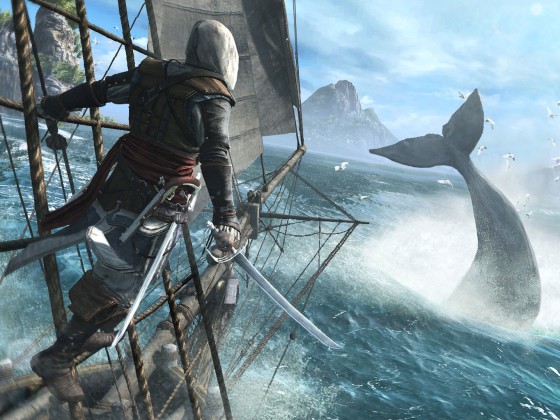The new "Grand Theft Auto" may still be setting all manner of sales records for the video game industry, but for gamers who want a little more historical context to all of their wanton destruction, there's a new game out this week to scratch that particular open-world itch.
"Assassin's Creed IV: Black Flag" is the latest installment in Ubisoft's popular line of historical adventure games that cast players as a member of a secret order of assassins who do battle with an illuminati-like order known as the Templars.
While previous games have been set in vibrant historical locales such as Renaissance Italy and Colonial America, "Black Flag" takes players into the "Golden Age of Piracy." The new game offers series staples such as open-world exploration and stealth-based assassinations along with new pirate-friendly features such as sailing and ship-to-ship combat.
As with Electronic Arts' "Battlefield 4" and Activision's upcoming "Call of Duty: Ghosts," "Assassin's Creed IV" arrives at an important period of transition for both Ubisoft and the game industry at large. Sony and Microsoft will both release their next-generation video game consoles—the PlayStation 4 and Xbox One respectively—next month, and each of these influential video game publishers is trotting out its highest-profile franchise in the hopes of securing a decent market share.
The stakes are higher for Ubisoft than its close competitors, however. Earlier this month, the company announced that two of its most highly anticipated next-generation launch titles — the futuristic open-world game "Watch_dogs" and the multiplayer-heavy racing game "The Crew" — were both being delayed until the spring of 2014 at the earliest.
Lewis Ward, research manager for gaming at IDC, told NBC News that investors didn't take kindly to the news.
"They got slammed in their stocks because they're not going to hit their fourth-quarter targets," Ward said.
Seeing those kinds of consequences for delaying some of its products only puts more pressure on the ones that have been shown to work for the company already, Ward said.
"Assassin's Creed" is chief among these, no doubt. But even for longtime fans of the series, the degree of corporate influence on the series can be a bit disconcerting.
'Creed' history
The first "Assassin's Creed" was released to widespread critical acclaim in 2007, with many critics praising the unprecedented level of attention to historical detail and the character-driven storytelling.
Soon afterward, however, Ubisoft put the franchise into a demanding annualized release schedule similar to the one Activision employs for its blockbuster "Call of Duty" franchise—different teams would leapfrog off one another, turning out new "Assassin's Creed" games every year beginning in 2009 with "Assassin's Creed II."
This kind of annualized structure might make sense for a militaristic first-person shooter like "Call of Duty" since most of the games in that series are remarkably similar in tone and style. But for a series that many fans consider to be the most high-minded of contemporary open-world games, the iterative release schedule had some unpleasant consequences. By the time that "Assassin's Creed: Revelations" arrived in 2011, fans were getting impatient. A review in the influential gaming magazine Edge said the series "has been quietly compromised by age."
Ward wasn't so doubtful about "Assassin's Creed's" future, telling NBC News that "simply because it's put on an assembly line, that doesn't mean the quality is going to go down necessarily." Compared to runaway successes like "The Elder Scrolls V: Skyrim" or "Grand Theft Auto V," which took Rockstar Games some five years to develop, however, he acknowledged that each new "Assassin's Creed" might not be quite as groundbreaking as a new GTA.
"I don't think that Ubisoft is that masterwork-of-art type of company," Ward said. "They tend to think about what they can deliver in a shorter timeframe."
Yannick LeJacq is a contributing writer for NBC News who has also covered technology and games for Kill Screen, The Wall Street Journal and The Atlantic. You can follow him on Twitter at @YannickLeJacq and reach him by email at: Yannick.LeJacq@nbcuni.com.
